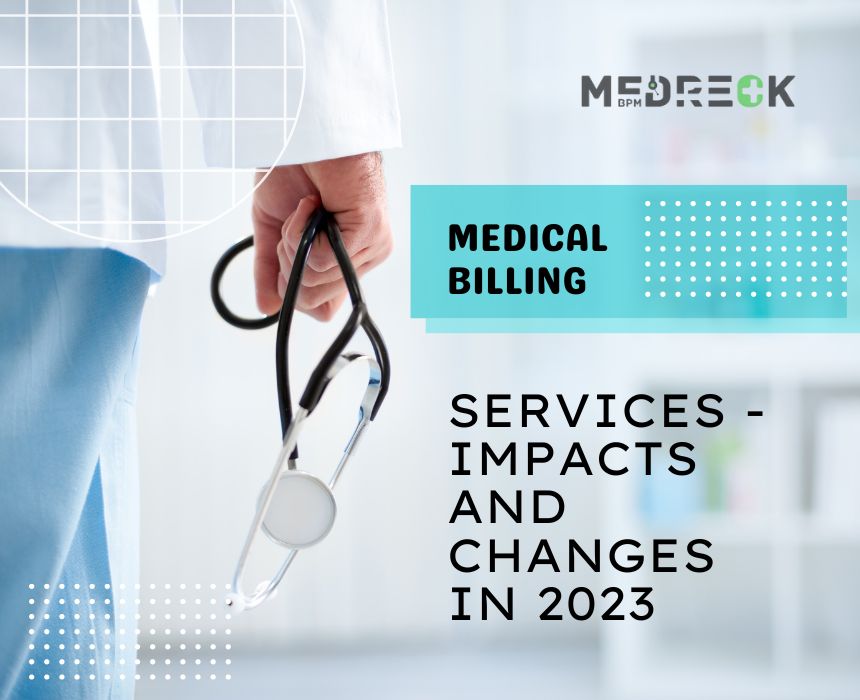Tables of Content
1. What is Medical Billing?
Medical billing is the activity, where the medical billers are involved to clarify by interpreting between the healthcare providers and insurance providers for the keen claim of a patient's diagnosis. Medical billing is an intrinsic and fundamental process which serves as a backbone to the US healthcare system.
2. How it Works?
-
The basic process done through Medical billing is to translate, the healthcare provider and the patient's meet into the languages that healthcare facilities use for claims , submission and reimbursement.
-
Medical billing is crucial to the financial stability of healthcare providers. Without proper billing, healthcare providers may not receive the necessary payments for their services, which can result in financial instability and even bankruptcy. So it highly supports maintaining the cycle.
3. Process of Medical Billing

Medical billing ensures that patients receive accurate bills and that insurance companies are billed correctly.
The process of medical billing typically begins with the patient's visit to a healthcare provider. The provider will document the services provided to the patient and assign appropriate medical codes to those services. These codes are used to identify the medical procedures and services provided and are necessary for billing purposes.
After assigning the medical codes to a patient's insurance company the claim will be submitted. Then the work of the insurance company at this point is to evaluate the claim and to regulate the services provided by checking whether the services are covered in the patient's insurance policy. If it is done ,then the insurance company will remunerate the healthcare provider for the services provided.
If the claim is refused by the insurance company to accept, the healthcare provider may need to appeal the decision. Sometimes this act can be challenging and complicated and requires keen and extended documentation or communication with the insurance company.
4. How RCM works to recall the MIPS?
-
Speaking about revenue, Revenue Cycle Management (RCM) and the Merit-based Incentive Payment System (MIPS) have both had a significant impact on healthcare billing and reimbursement.
-
MIPS was introduced by the Centers for Medicare and Medicaid Services (CMS) as a program to incentivize healthcare providers to provide high-quality care. Based on four categories the healthcare providers will receive payment adjustments under MIPS. The four categories include Quality, Improvement activities , promoting Interoperability and cost.
-
MIPS and RCM are both important for healthcare providers, but they serve different purposes. While MIPS incentivizes providers to improve the quality of care they provide, RCM focuses on optimizing the financial aspects of healthcare, such as revenue collection and claims processing.It is understandable that some may feel nostalgia for MIPS, as it represented a way to incentivize quality care and improve outcomes for patients.
-
However, RCM remains an important aspect of healthcare billing and reimbursement, and optimizing revenue collection and processing is crucial for the financial stability of healthcare providers.
5. The impact of reporting changes in 2023
-
In 2023, there are reporting changes that will impact the way healthcare providers approach RCM and MIPS. Additionally, new technologies such as ADS RC are emerging as valuable tools in optimizing the revenue cycle.
-
Many healthcare providers are nostalgic for the days when MIPS was the primary focus of quality improvement. With the introduction of value-based care and other payment models, the focus has shifted away from MIPS and towards other aspects of healthcare reimbursement.
-
However, MIPS remains an important program, and healthcare providers must still report on their performance in the four categories: Quality, Improvement Activities, Promoting Interoperability, and Cost.
-
One of the significant changes is the transition to a single MIPS performance threshold, which means that the performance threshold will be the same for all healthcare providers.
-
Additionally, the weight of the Quality category will increase to 40%, while the weight of the Cost category will decrease to 20%. These changes highlight the importance of optimizing the revenue cycle, which is where RCM comes into play.
-
RCM involves the process of managing healthcare revenue by optimizing the collection, processing, and management of patient financial data. It includes activities such as patient registration, charge capture, claim submission, and payment posting.
-
One emerging technology that is helping healthcare providers optimize their revenue cycle is ADS RC. ADS RC is an AI-powered revenue cycle management solution that uses machine learning and predictive analytics to optimize revenue cycle performance. With ADS RC, healthcare providers can automate repetitive tasks, reduce errors, and improve efficiency, ultimately leading to improved financial performance.
6. Conclusion
-
In conclusion, while healthcare providers may be nostalgic for the days when MIPS was the primary focus of quality improvement, RCM remains an important aspect of healthcare billing and reimbursement.
-
The reporting changes in 2023 highlight the importance of optimizing the revenue cycle, and new technologies such as ADS RC are emerging as valuable tools in achieving this goal. By focusing on RCM and utilizing innovative technologies, healthcare providers can optimize revenue cycle performance and achieve financial stability while still providing high-quality care to their patients.
-
Overall, medical billing is a critical component of the healthcare industry, ensuring that healthcare providers receive payment for their services and that patients receive accurate bills. While it can be complex and time-consuming, outsourcing to a third-party billing company can help streamline the process and improve financial stability for healthcare providers.
 +91 79940 53126
+91 79940 53126 +1 208 207 5165
+1 208 207 5165